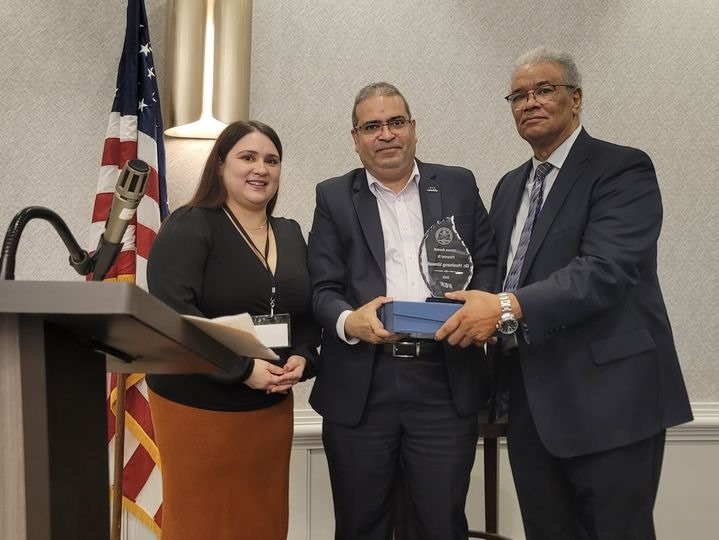Congratulations to Hoshang Unwalla, PhD, who received the 2022-23 Outstanding Mentor Award from the Florida Education Fund’s McKnight Doctoral Fellowship Program. The McKnight program aims to increase the number of African Americans and Hispanics in Florida who earn PhDs.
Professor Unwalla was nominated by his graduate student Maria José Santiago who also attended the awards ceremony in Tampa. Maria, an FIU College of Arts, Sciences, and Education student, is working on her PhD in Biochemistry.
Unwalla’s lab in the Department of Immunology and Nano-Medicine studies lung diseases in HIV smokers and non-smokers to develop therapeutic drugs to improve or arrest lung function decline in these diseases.
About Hoshang Jehangir Unwalla, PhD
Professor, Immunology and Nano-Medicine
Herbert Wertheim College of Medicine, Florida International University
Hoshang Jehangir Unwalla obtained his Ph.D. at the National Institute of Immunology, Jawaharlal Nehru University, Delhi, India. He was recruited as a post-doctoral fellow in the laboratory of Dr. John Rossi at the Beckman Research Institute, City of Hope, Duarte CA. As a post-doctoral fellow, his research involved designing gene therapy approaches to suppress HIV replication. During his post-doctoral fellowship, he was awarded the prestigious Foundation for AIDS Research (amfAR) fellowship, one of the four awarded worldwide that cycle.
In 2008, he moved to the University of Miami as Research Assistant Professor, to develop a core facility for aptamers in Immunotherapy. Dr. Unwalla developed an interest in HIV and lung disease and in 2009 he branched his area of research to pulmonary medicine with a goal towards developing research projects in pulmonary complications in smokers and HIV patients. He has received funding from the American Lung Association (ALA) and Florida Department of Health and is currently funded by Flight Attendant Medical Research Institute, National Institutes of Health, and the Department of Defense to support his research.
Education
Post-doctoral fellowship, Beckman Research Institute, City of Hope, Duarte CA.
PhD, National Institute of Immunology, Jawaharlal Nehru University, Delhi, India.
Research
Unwalla’s current research interests are primarily focused on understanding the pathophysiological mechanisms that lead to Lung comorbidities in HIV smokers/nonsmokers. with a goal towards developing therapeutics to restore or arrest the decline of lung function in these diseases.
In aging HIV-infected populations comorbid diseases are important determinants of morbidity and mortality. Combination antiretroviral therapy has made HIV a treatable disease. However, HIV patients die of non-AIDS comorbidities almost a decade earlier that their non-HIV counterparts. Lung diseases such as COPD, pulmonary hypertension, and pneumonia are emerging as significant comorbidities in the HIV-infected population This is exacerbated in HIV patients who are addicted to nicotine and smoke tobacco. HIV-infected patients with an episode of pneumonia also often demonstrate a permanent decline in lung function. Pulmonary infection also induces recruitment and activation of immune cells leading to de novo infection of target cells and enhanced HIV replication. Thus, bacterial pneumonia can also contribute to HIV progression.
The etiology of HIV pneumonias is very similar to that observed in pneumonias associated with chronic airway diseases like cystic fibrosis and chronic bronchitis associated with smoking. Impaired mucociliary clearance is a hallmark of these diseases. HIV proteins and cigarette smoke suppress important components of the mucociliary clearance apparatus and TGF-beta signaling plays a prominent role in the process. The laboratory research focuses on understanding the pathophysiological mechanisms that lead to microbial colonization of the airways in HIV-infected patients and testing therapeutic leads to rescue MCC dysfunction in the context of HIV infection and CS with a long-term goal towards preventing recurrent lung infections in people living with HIV. Another focus of my laboratory is to determine the mechanism by which HIV proteins and cigarette smoke alter the microRNAome in the bronchial epithelium which in turn alters the mitochondrial homeostasis contributing to chronic inflammation characteristic of COPD. To accomplish these goals Unwalla’s laboratory is currently working on three different projects.
- Role of TGF-b signaling in mucociliary dysfunction in smokers and COPD patients
- Tracheobronchial mucociliary dysfunction in HIV patients
- Developing aptamer-siRNA chimeras as therapeutics in airway diseases
- Determine the effects of an HIV/smoke altered microRNAome on mitochondrial dynamics in bronchial epithelial cells and its impact in inflammation.
Updated references
- Dutta RK,; Chinnapaiyan S.; Rasmussen, L.; Raju, VS.; Unwalla HJ. A Neutralizing Aptamer to TGFBR2 and MiR-145 Antagonism Rescue Cigarette Smoke-and TGF-β-Mediated CFTR Expression. Mol Ther. 2018 Dec 6. pii: S1525-0016(18)30583-5. doi: 10.1016/j.ymthe.2018.11.017. [Epub ahead of print] (Cell Press; Impact factor 7.02).
- Chinnapaiyan S.; Dutta. RA.; Bala J.; Parira T.; Agudelo M.; Nair, M; Unwalla HJ. Cigarette Smoke Promotes HIV Infection of Primary Bronchial Epithelium and Additively Suppresses CFTR function. Sci Rep. 2018 May 22;8(1):7984. doi: 10.1038/s41598-018-26095-z.

